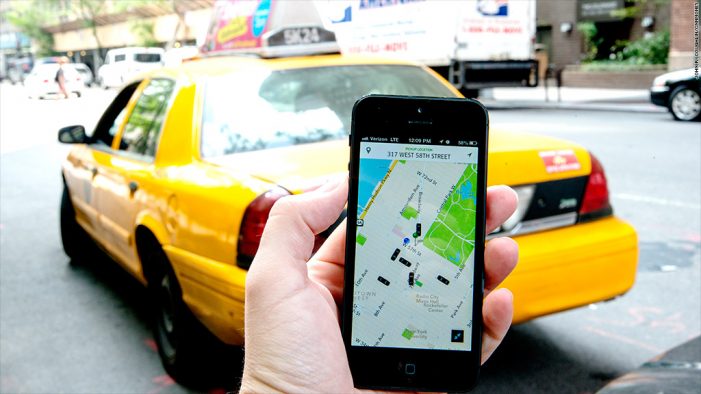Two competing ordinances to finally regulate “ride sharing” services or “TNEs” like Uber and Lyft will likely dominate the already full-agenda Miami-Dade County 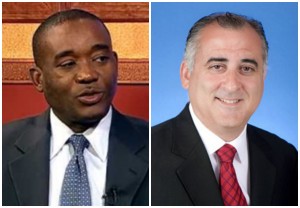 commission meeting Wednesday.
commission meeting Wednesday.
We know taxi cab drivers are already a staple in commission chambers whenever this comes up (and sometimes when it doesn’t). And now, Uber has rallied riders to flood County Hall in their support. An email blast tells them to show up at 8 a.m. hours earlier than the item will be presented, presumably so they can take up the limited space and the taxi drivers and supporters are relegated to the lobby.
The email also asks supporters to urge commissioners to vote no to the ordinance sponsored by Chairman Jean Monestime and yes to the one sponsored byCommissioner Esteban Bovo.
This already in and of itself is odd. Bovo has what is called a “placeholder” on the item since he retrieved an earlier version when it looked like it would die in committee. Bovo’s office has seen five different versions in the 18 months since and Monestime — who has failed to call a workshop on the ride sharing phenomenon — comes in at the last minute with his own legislation, drawing a smear campaign by Uber.
Read related story: As regulation looms, Uber goes mafioso with ad campaign
Lots of people at County Hall have raised an eyebrow. Does Monestime want a mark in his win column? A former taxi driver himself, is the chairman acting on a loyalty to cabbies? Or is that loyalty to his Haitian American community, since a good number of Miami taxistas are Haitian. Oh, please. Like Barbara Jordan doesn’t take care of the black community and Bovo doesn’t push the Cuban American agenda.
In any case, there are two different versions and while there are a lot of differences, the two big ones are basically 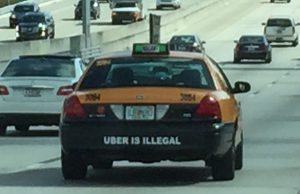 about insurance and background checks — two things that ultimately protect the consumer and for which Monestime ought to be supported. His concerns are legitimate and ought to be investigated or discussed more amply. They certainly don’t need to be threatened with a veto from Mayor Carlos Gimenez, who loves Uber so much that he wants to forgive about half their fines, or somewhere around $1.5 million in citations.
about insurance and background checks — two things that ultimately protect the consumer and for which Monestime ought to be supported. His concerns are legitimate and ought to be investigated or discussed more amply. They certainly don’t need to be threatened with a veto from Mayor Carlos Gimenez, who loves Uber so much that he wants to forgive about half their fines, or somewhere around $1.5 million in citations.
Luckily, neither the Monestime nor the Bovo ordinance calls on any sort of fine forgiveness. That’s just crazy. If we start doing that, then all the companies that have fines for zoning violations or other regulatory issue could appeal, and with good cause.
Read related story: Carlos Gimenez moves to legalize Uber, pardon penalties
Main difference number one: The chairman says he is willing to do away with the geography tests and the English proficiency test that taxi drivers have to pass, but he wants Uber drivers to get county hack licenses and pass a county background check. Bovo’s version says no special license is needed and that the company can do its own level 3 background checks. Forget that it’s like the fox guarding the hen house. That already hasn’t worked well in California, where state prosecutors have filed a civil lawsuit against Uber, saying that their background checks missed people previously convicted of murder and sex crimes.
Main difference number two: 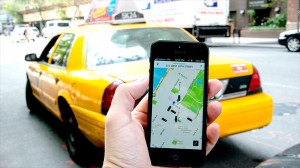 Monestime’s ordinance also requires drivers to have 24-hour commercial insurance on their vehicles. Bovo’s law would let them fall under the network’s umbrella insurance while they are working. Alex Annunziato, Bovo’s legislative director, says that they function as a hybrid of both a commercial vehicle, when engaged in the Uber activities, and a private car when not. He says that it is legally sufficient, but Ladra might want to hear from someone else. Someone not at the county attorney’s office.
Monestime’s ordinance also requires drivers to have 24-hour commercial insurance on their vehicles. Bovo’s law would let them fall under the network’s umbrella insurance while they are working. Alex Annunziato, Bovo’s legislative director, says that they function as a hybrid of both a commercial vehicle, when engaged in the Uber activities, and a private car when not. He says that it is legally sufficient, but Ladra might want to hear from someone else. Someone not at the county attorney’s office.
And is it fair to require it of taxi companies but not of Uber or Lyft?
To that end, Bovo’s ordinance definitely seems to address the discrimination more fully. It does try to bring the two industries together, albeit under a 286-page chapter of the code, by taking some of the regulations away from taxi companies.
Read related story: Double standard: Miami-Dade lets Lyft, Uber run over rules
“Whatever we do for the TNEs, we have to do for the taxi cabs and limousines also,” Annunziato said. “That’s what we’re doing — going in and cleaning up code that hasn’t been touched in 30 years.”
Cab companies can conduct their own background checks, if they find that more efficient than going through the county. Drivers don’t need a special license, which means there will be no county registry of for-hire passenger drivers.
“We give taxi companies the same ability to certify that their drivers meet certain minimum standards,” Annunziato said.
But isn’t that the fox in the hen house still?
Meanwhile, taxi cabs keep carved out sections 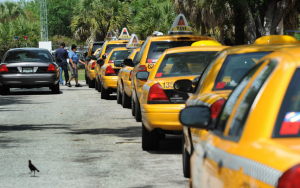 just for them, like the airport and seaport. They are also allowed to stage outside hotels and convention centers, while Uber vehicles will not be permitted to. And they are allowed to be hailed, while Uber cannot be hailed.
just for them, like the airport and seaport. They are also allowed to stage outside hotels and convention centers, while Uber vehicles will not be permitted to. And they are allowed to be hailed, while Uber cannot be hailed.
But all the taxi companies will have to have an app hailing mechanism by October, under Bovo’s law.
One thing that isn’t addressed are the rates. One of the reasons Uber is so competitive is the ease of app hailing. But once taxi cabs have the same thing, the only difference is the rates. Uber drivers are able to undercut taxis most of the time — and commit price gouging during “rate surge” peak hours, like New Year’s Eve when a ride home cost hundreds — because their rates aren’t mandated. Taxi cabs, on the other hand, have meters that charge fares set by the county, not the open market.
“Taxi cabs can’t survive without regulating their rates,” Annunziato said. “They can’t survive without them. They’re not supposed to be competitive. They’re not supposed to be head-to-head competitors.
“They’re the work horses of the fleet,” he said.
“They are not the only game in town anymore, but taxis are not going the way of the dinosaur yet,” Annunziato added.
Key word: Yet.

